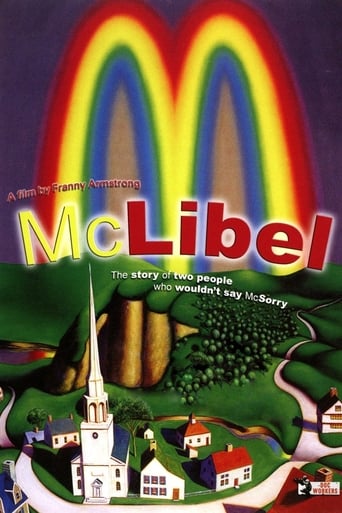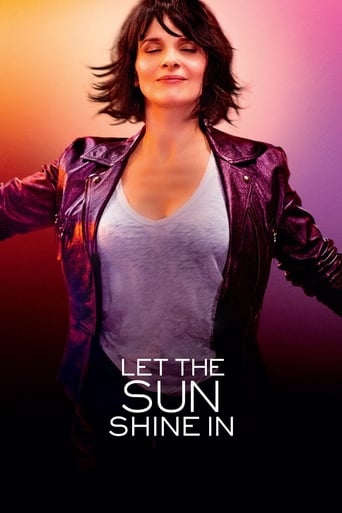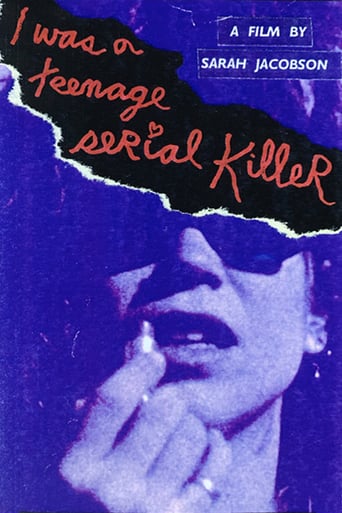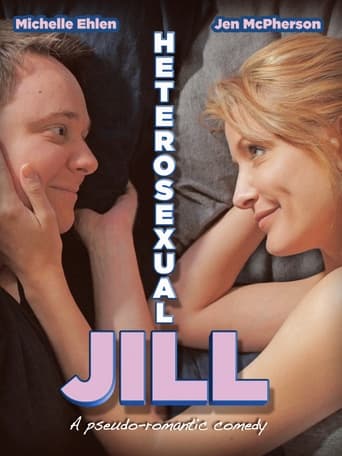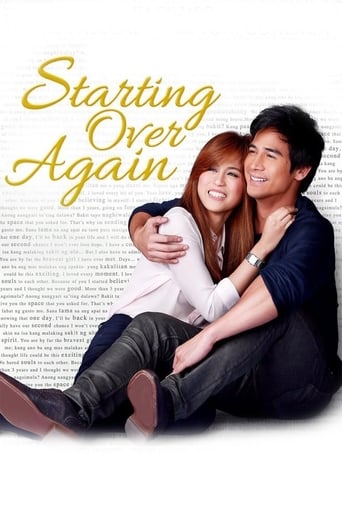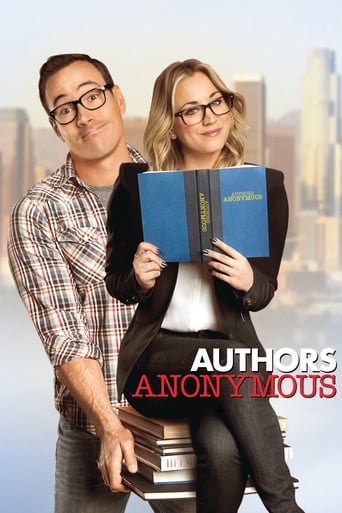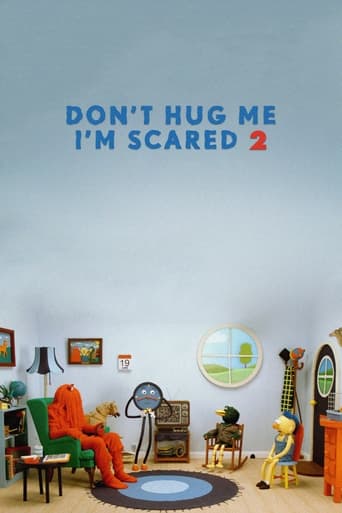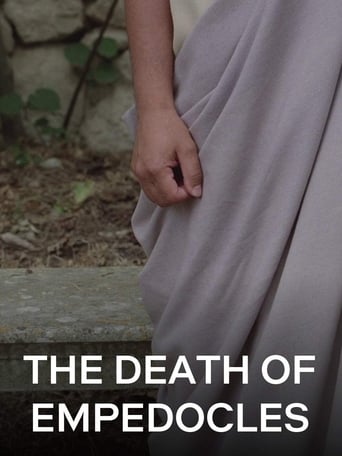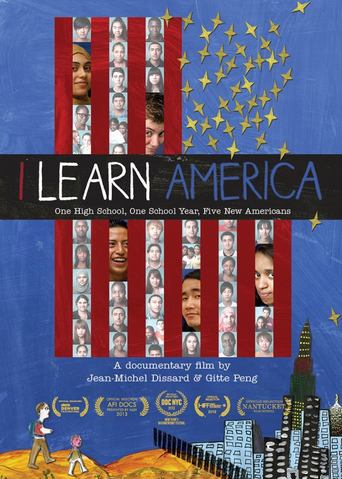McLibel (2005)
McLibel is a documentary film directed by Franny Armstrong for Spanner Films about the McLibel case. The film was first completed, as a 52 minute television version, in 1997, after the conclusion of the original McLibel trial. It was then re-edited to 85 minute feature length in 2005, after the McLibel defendants took their case to the European Court of Human Rights.
Watch Trailer
Free Trial Channels
Cast


Similar titles
Reviews
everything you have heard about this movie is true.
A lot of perfectly good film show their cards early, establish a unique premise and let the audience explore a topic at a leisurely pace, without much in terms of surprise. this film is not one of those films.
The biggest problem with this movie is it’s a little better than you think it might be, which somehow makes it worse. As in, it takes itself a bit too seriously, which makes most of the movie feel kind of dull.
A clunky actioner with a handful of cool moments.
This movie was fun compared to other documentaries. I think it did a very good job of humanizing its protagonists, who were a couple of grassroots organizers who took on a huge corporation, and won.British Libel law is used by big corporations and individuals to do things they would never be allowed to get away with anywhere else - actually sue people for stating their opinions. The plaintiffs actually had to prove that fast food is bad for us, which is kind of like having to prove the sky is blue...McDonald's is like a drug pusher, and we the public are like junkies. Let's be honest, we'd all be better off if we lived a vegan lifestyle, and would have less impact on the planet, but where would the fun in that be? Like Mephistopheles, McDonald's and their ilk give us what we want, and we hate them for it. But let's point out the devil is still a devil, even if we give in to his temptations.
I would describe myself as an ultraliberal. I am certainly no fan of McDonald's. I never eat there, and I don't own any stock. The fact that a company like McDonald's exists makes me cringe.Honestly, I feel this documentary was poorly made, and that most reasonable people who are truly interested in the famous McLibel trial would be better off reading about the McLibel trial than wasting time viewing this film. I feel that many viewers of this film feel that society would be a better place if more people watch this film and as a result are giving this unjustifiably good reviews. In truth, this is a really bad documentary. Even though it is less than 90 minutes long, it is extremely boring and frustratingly uninformative.I feel the McLibel case made the McDonald's Corporation look pretty silly. I really wanted an informative documentary that was going to present the facts surrounding the trial and the events leading up to the trial, possibly make me laugh, and explain what exactly it is about British law that made this sort of lawsuit seem viable to the McDonald's lawyers. Instead, I was presented, for the most part, with an uninformed and naive, one-sided, boring rant against the McDonald's Corporation for its business practices, primarily from the point of view two unlikeable, self-righteous, and naive characters.My first main complaint is that the title is a bit misleading. This is more a polemic against the McDonald's Corporation and its business practices than it is a documentary about the McLibel case per se. If the parts that weren't actually about the trial were cut out, I'd estimate this film would've been maybe about 30 minutes long. And there is hardly anything here about the pro-plaintiff British libel laws that made this kind of suit seem feasible for McDonald's to pursue in the first place (but only in the UK)--which really would have been the most interesting subject to talk about, in my view. It is as if the filmmaker wanted some excuse to make a film to educate us all about how bad McDonald's is and viewed the McLibel trial as a perfect excuse. As if any reasonable viewer doesn't already know that McDonald's food tends to be unhealthy, or that McDonald's workers get paid very low wages, or that millions of chickens are slaughtered to make Chicken McNuggets! Who doesn't know this? Well, if you didn't already know it, you will have definitely learned it by the time this film is done, because it will have been repeatedly beaten into your brain, unless, of course, you fall asleep first.My second main complaint is that the two principle characters, the defendants in the McLibel case, come off as self-righteous and just kind of silly, naive, twittering dingbats. For example, they and some other characters that talk in the film repeatedly express dismay at the notion that a multinational corporation such as McDonald's actually cares only about profits and not really about its workers or its consumers as people (except to the extent caring about us translates into profits of course). But these complaints are naive. You can't complain that vociferously about a multinational corporation wanting to maximize profits--their shareholders could sue them if they do anything less--the complaint needs to be directed more at the relevant law that allows and encourages this kind of corporate behavior, the people that support these laws, and, to some extent, at the consumers that support McDonald's and the workers that won't unionize and that accept such low wages. It's one thing to state the facts about McDonald's dispassionately and let the viewer decide for him- or herself whether to support McDonald's with his/her wallet, or to state the facts dispassionately and then go on to explain not only the situation the workers and consumers find themselves in relative to McDonald's, but also the situation that the McDonald's Corporation finds itself in relative to its stockholders, but it's another thing to one-sidedly skewer the McDonald's Corporation for the entire situation when the workers themselves, the consumers themselves, and the legal systems controlling the countries in which McDonald's operates and the people controlling those legal systems all share the blame. My third main complaint is that the film is not well-organized. It's just kind of all over the place, and presented in a random haphazard manner.My fourth and most important complaint is that the film is boring, thanks in no small part to the fact that the two main characters, the defendants in the McLibel case, are boring and unsympathetic characters.The best documentaries are those that either neutrally present facts about events, or present the best of all sides of whatever issue is being discussed from the points of views of well-informed and intelligent people, and that do so in an interesting manner. That does not in any way describe this documentary. I give it a 2 out of 10, because there are actually some parts of this film here and there that do actually talk a bit about the trial, but, really, I feel that's a pretty generous rating.If you want to be beaten over the head with an anti-McDonald's rant, see this film. If you want to learn about the McLibel trial, do yourself a favor and ignore the other reviewers and go read about it instead. It's a fascinating trial. This is a dumb film that tangentially touches on that fascinating trial to a small extent between rants about how evil McDonald's is.
To the previous poster, justsomeregularguy, who equivocates the producers of this film to multinational corporations, please explain to me how this documentary has made tens of billions of dollars per annum, like a multinational worth their salt does. Your whole argument, and your anger over a certain type of filmmaker or person fails with a fallacy of that caliber. Read Adorno's The Culture Industry and get over it.I am SO sick and tired of people accusing any and all director or filmmaker of cashing-in by copying or riding on coattails of others just because they see the flood of remakes/ripoffs/plaigarisms bouncing between Hollywood, Bollywood and Asia (aka The 2006 Oscar winner) and apply that in all cases: Another baseless equivocation! Quite simply, a film like this will hardly make ANY money off direct sales. Most documentaries make their money back due to library acquisitions and television broadcast rights. I really have to question the mind that thinks that a documentary like this is made motivated by greed. Films like the Corporation and Super Size Me are exceptions, and frankly the whole "documentaries are the new blockbuster" paradigm is also way past its sell-by date, and to buy into that is to accept what amounted to hype in the first place. For every Incovenient Truth there are thousands of conventional narrative films. We notice those docs because of their exceptional nature in the film marketplace. Again, McLibel is not exactly Spider-man 3. Let's please keep things in perspective. If anything, you give this film you seem to be angry at way too much credit. You also indirectly insult filmgoers by assuming we're all suckers and wouldn't be able to see past a rip-off and you attempt to privilege yourself as if you know better, by proxy. If anything, it's whatever amount of attention the Palme D'Or has brought to Ken Loach's work that might get some more people to see this. Finally, films of the same subject and type have been made in close proximity to each other; it's called a zeitgeist, and more than one person can tap into it at the same time. The Illusionist/The Prestige for example. Superficially: Costume dramas with magic. On any other, non-reflexive level: Totally different narratives.
This is a low budget but very, very entertaining account of Helen Steel and David Morris's fight against McDonalds. They were caught distributing leaflets accusing McDonalds of polluting the environment, cruelty to animals, aiming their produce at children and being extremely unhealthy and lying about it. McDonalds claimed they were lying, so the postman and the gardener represented themselves in a 7 year court case. This documentary charts the trial and verdict, and further footage after the event. It is cheap and cheerful, but astounding in it's simplicity. This was a landmark case that made it acceptable to challenge corporations, in fact, it almost seems to be the pre runner for many documentaries out there. More importantly, it took the wind out of McDonald's sails and forced them to readdress many of the issues they were challenged over. It's a great film - I recommend it.

